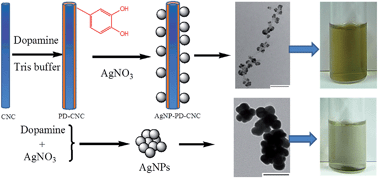Enhanced colloidal stability and antibacterial performance of silver nanoparticles/cellulose nanocrystal hybrids
Abstract
The aggregation of nanoparticles has been shown to significantly reduce the activity of nanomaterials, resulting in inferior performance. As an alternative to the use of traditional capping agents, stabilization of unstable nanoparticles with water-dispersible and biocompatible carriers is a promising strategy. A bioinspired coating strategy was developed and the hybrid nanoparticles displayed excellent colloidal stability that significantly improved antibacterial activity when silver nanoparticles (AgNPs) were used as a model. Cellulose nanocrystals (CNCs) were first modified with dopamine, followed by in situ generation and anchoring of AgNPs on the surface of CNCs through the reduction of silver ions by polydopamine coated CNCs. The results indicated that the dispersion stability of AgNPs was significantly enhanced by the CNC, which in turn resulted in more than fourfold increase in antibacterial activity based on antibacterial studies using Escherichia coli and Bacillus subtilis.


 Please wait while we load your content...
Please wait while we load your content...